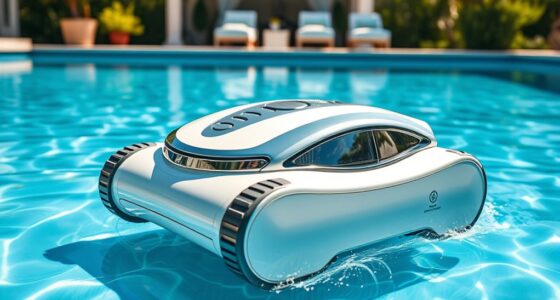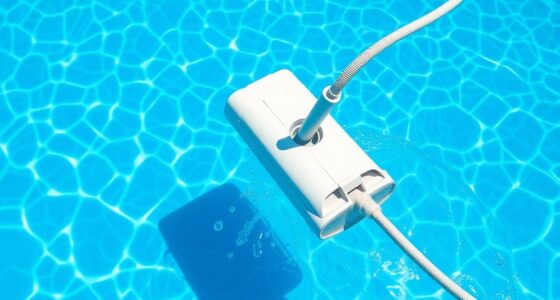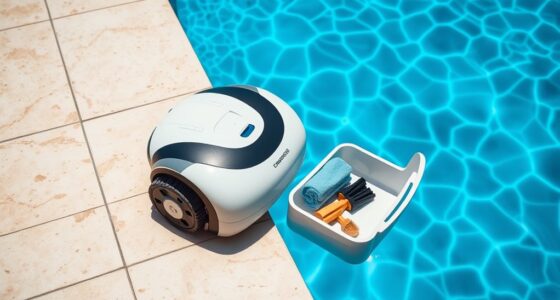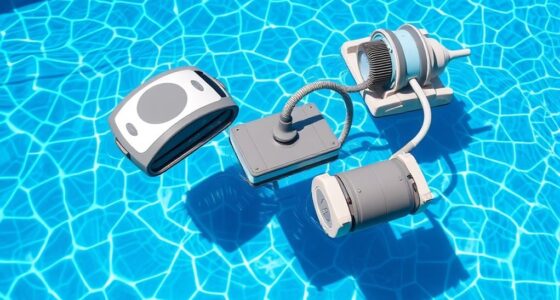Robotic pool cleaners are a worthwhile investment because they simplify your maintenance routine, improve water quality, and save you time and money over the long run. They efficiently reach tricky spots, reduce manual scrubbing, and help keep your pool cleaner longer. Although the initial cost might seem high, the benefits in convenience and efficiency make it a smart choice. If you’re curious about how they can transform your pool upkeep, there’s more to discover below.
Key Takeaways
- They efficiently clean pool surfaces, reducing manual effort and ensuring better water quality.
- Over time, they lower maintenance costs by decreasing chemical use and professional cleaning needs.
- Their user-friendly features allow easy operation, scheduling, and minimal setup.
- Investing in a robotic cleaner can extend pool equipment lifespan by preventing debris buildup.
- Overall, they save time, effort, and long-term expenses, making them a worthwhile addition to pool care.
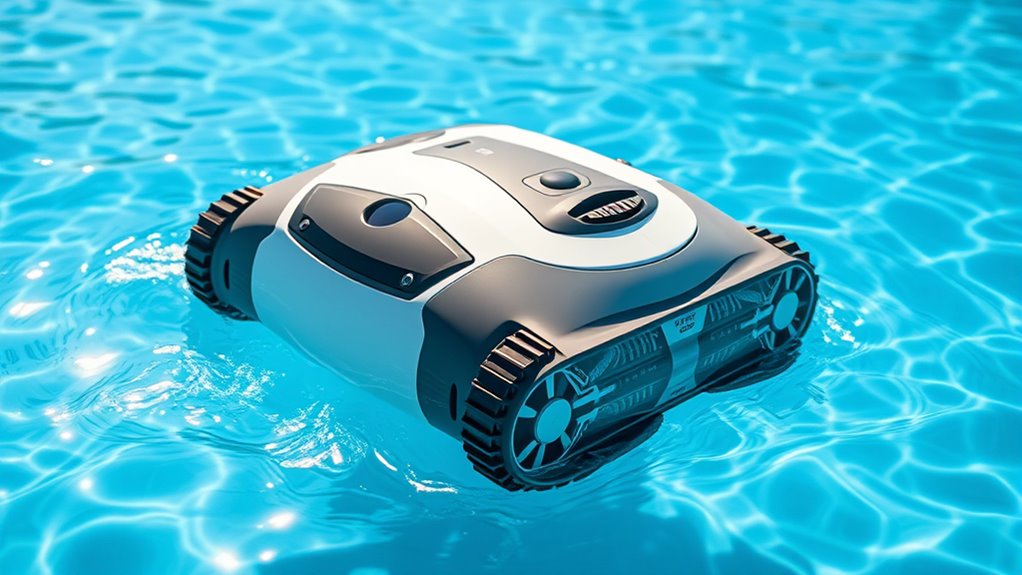
Are robotic pool cleaners a smart investment for pool owners? If you’re tired of spending hours on manual cleaning and want to keep your pool pristine with minimal effort, then robotic cleaners might be just what you need. Traditional maintenance often involves tedious manual cleaning, scrubbing the walls and vacuuming the floor by hand, which can be time-consuming and physically demanding. Plus, maintaining proper chemical balancing is essential to keep your pool safe and inviting, but it’s easy to overlook some of these details when you’re bogged down with manual tasks. Robotic pool cleaners take the hassle out of this routine, allowing you to focus on enjoying your pool rather than maintaining it.
One of the biggest advantages of investing in a robotic cleaner is how it complements your regular pool maintenance routine. While manual cleaning is effective, it’s often not enough to reach every nook and cranny, especially in hard-to-access spots. Robotic cleaners are designed to navigate your pool’s surfaces efficiently, scrubbing algae and debris that might otherwise be missed. This means your pool stays cleaner longer, reducing the frequency of manual intervention. When your pool is cleaner, you’re less likely to encounter cloudy water or algae growth, which can throw off your chemical balance. By keeping your pool consistently clean, you help maintain proper chemical levels, reducing the amount of chemicals needed and making chemical balancing easier and more effective.
Robotic cleaners enhance pool maintenance by reaching hidden spots and reducing chemical imbalances for a cleaner, healthier pool.
Robotic pool cleaners also save you money over time. Although the initial investment might seem steep, they can cut down on the use of pool chemicals, filters, and even professional cleaning services. Because they work automatically and regularly, you’ll spend less on chemicals, which means fewer imbalances and less need for costly adjustments. Plus, they extend the lifespan of your pool equipment by reducing debris buildup, which can cause wear and tear over time. This kind of preventative maintenance offers long-term savings and peace of mind, knowing your pool is well cared for without constant manual effort.
Furthermore, robotic pool cleaners are user-friendly and require minimal setup. Once programmed, they operate independently, and many models come with features like programmable schedules and remote control. This ease of use allows you to stay on top of pool maintenance without sacrificing your free time. With a robotic cleaner handling the bulk of cleaning, you can allocate your efforts toward more enjoyable activities or focus on other aspects of pool care, such as monitoring chemical levels and ensuring proper water circulation. Overall, these devices are an investment in convenience, efficiency, and the longevity of your pool, making them a worthwhile addition for any pool owner looking to simplify maintenance while keeping their water crystal clear.
Frequently Asked Questions
How Long Do Robotic Pool Cleaners Typically Last?
Robotic pool cleaners usually last around 3 to 8 years, depending on how well you maintain them. Battery lifespan plays a big role—most batteries need replacement after a few years. Motor durability is also essential; a sturdy motor can extend your cleaner’s life. Regular cleaning and proper storage help maximize their lifespan, ensuring you get the most out of your investment.
Are Robotic Pool Cleaners Suitable for All Pool Types?
Many believe robotic pool cleaners suit all pools, but that’s not always true. You might find they work well with your pool deck and maintain water chemistry, but some models struggle with inground or complex shapes. If your pool has unique features, check compatibility first. A robotic cleaner can save you time, yet understanding your pool’s specifics guarantees it’s the right fit, preventing frustration and maximizing your investment.
Do Robotic Pool Cleaners Require Professional Installation?
Robotic pool cleaners generally don’t require professional installation, making them convenient for most pool owners. Their installation complexity is minimal; you usually just need to place the unit in the water and connect it to power. If you encounter issues, many manufacturers offer excellent technical support to help you troubleshoot. Overall, you can set up and operate these cleaners yourself, saving time and money on professional services.
Can Robotic Pool Cleaners Handle Algae or Heavy Debris?
Robotic pool cleaners excel at handling heavy debris, effectively removing leaves, dirt, and larger particles. However, for algae removal, they might struggle unless equipped with specific scrubbing features or chemical assistance. While they can manage some algae, heavy infestations often require additional manual cleaning or chemical treatments. Overall, robotic cleaners are great for maintaining a clean pool, but for heavy algae, you may need to supplement their efforts.
What Is the Average Maintenance Cost for Robotic Pool Cleaners?
The average maintenance cost for robotic pool cleaners varies depending on the model and usage, but you can expect to spend around $100 to $300 annually. A good cost comparison shows that they typically require less maintenance and fewer repairs than traditional cleaners. You should plan for regular maintenance, like cleaning filters and inspecting brushes, which helps reduce maintenance frequency and prolongs your cleaner’s lifespan, saving you money over time.
Conclusion
So, are robotic pool cleaners worth it? Imagine stepping into your sparkling clean pool, the water inviting and crystal clear, without lifting a finger. But what if that sleek machine suddenly stops working just when you need it most? Will it save you time, or will it leave you scrambling? The decision hangs in the balance—your perfect, effortless swim might just depend on whether you take the plunge now or wait for the next big upgrade.


